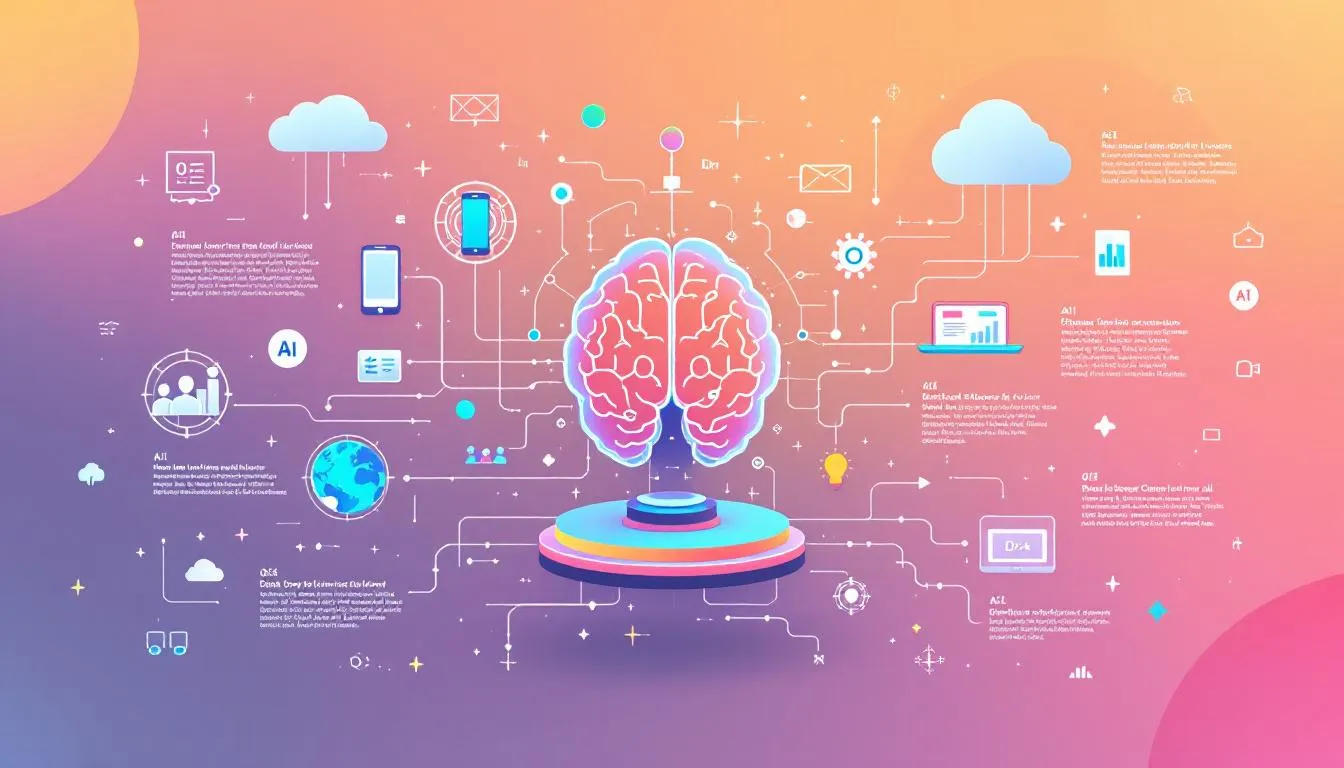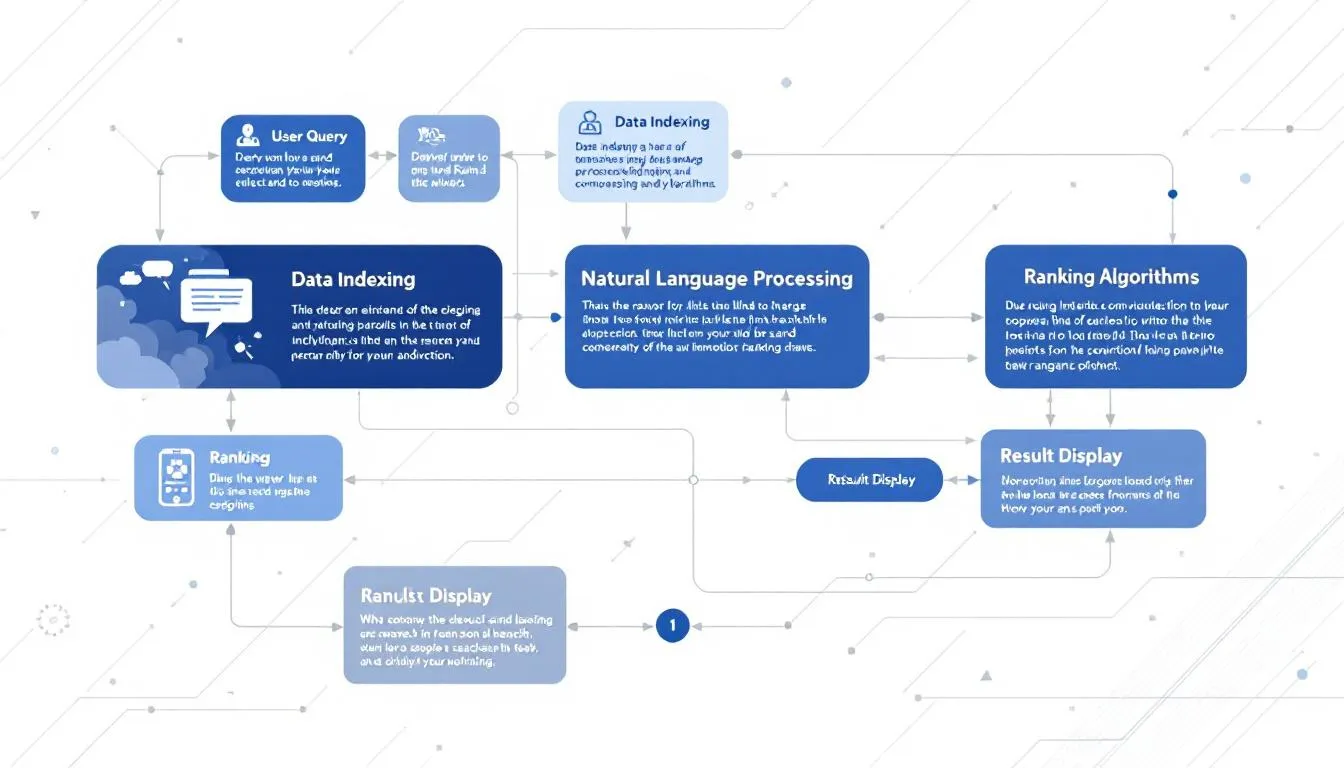AI automation for small businesses can save time, reduce costs, and improve efficiency. This guide will show you how AI can handle routine tasks, enhance decision-making, and provide better customer service. Discover key AI tools and learn how to integrate them smoothly into your daily operations.
Key Takeaways
- AI automation helps small businesses streamline operations, reduce costs, and improve customer experiences by automating routine tasks.
- Essential tools like AI-powered chatbots, CRM systems, and content creation apps enable small businesses to enhance productivity and marketing efforts.
- To successfully implement AI, businesses should prioritize clear objectives, ongoing system monitoring, and utilize readily available free tools.
Understanding AI Automation

AI automation isn't just a buzzword; it's a game-changer for small businesses. Leveraging AI technologies allows businesses to automate routine tasks, enhance decision-making, and boost overall operational efficiency.
But what exactly is AI automation, and why is it so crucial for modern businesses? Here's a breakdown.
Definition of AI Automation
AI automation involves using AI tools and AI technology to perform tasks with minimal human intervention. Unlike traditional business process automation, which relies on set rules, artificial intelligence automation uses machine learning and natural language processing to learn, adapt, and make data-driven decisions.
This allows systems like AI-powered chatbots to interact with customers seamlessly and efficiently.
Key Benefits of AI Automation
The benefits of AI automation are manifold. It significantly boosts operational efficiency by handling repetitive tasks faster and more accurately than humans. Small businesses can save up to 30% in operational costs by automating tasks.
Moreover, AI-driven solutions enhance customer experience by providing nearly error-free performance and 24/7 service. Imagine a world where your business operates smoothly around the clock—that's the power of AI.
Essential AI Tools for Small Businesses

Small businesses need the right tools to fully harness AI's power. From AI-powered chatbots to advanced CRM systems, these tools can streamline processes, reduce manual effort, and lower overhead costs.
Here are some essential AI tools that can revolutionize business operations.
AI-Powered Chatbots
AI-powered chatbots are transforming customer service. These bots use natural language processing and machine learning algorithms to respond to customer inquiries in real time, enhancing customer satisfaction. Tools like LiveChatAI and CustomGPT.ai allow businesses to deploy chatbots without extensive technical knowledge, making them accessible to small businesses.
Automating customer interactions significantly reduces operational costs and improving customer service improves conversion rates.
AI CRM Systems
AI CRM systems like HubSpot streamline sales processes by automating lead data entry, scoring, and sales forecasting. These systems can predict customer behavior, allowing businesses to tailor their marketing strategies and improve customer engagement.
Integrating AI chatbots with CRM software further enhances customer service and data management, making it a powerful tool for small businesses.
Content Creation Tools
Generative AI tools for content creation are a boon for small businesses. Tools include:
- ChatGPT, Midjourney, and DALL-E, which can create diverse types of content, from written materials to visuals, including AI generated content.
- Anyword and Copy.ai, which help generate marketing copy.
- Fliki and Storydoc, which offer unique capabilities for creating voiceover videos and personalized presentations.
These tools not only save time but also enhance the reach and effectiveness of your marketing efforts; one such tool can significantly improve your results.
Implementing AI Automation in Daily Operations

Integrating AI automation in daily operations can transform business functions. From automating data entry to streamlining inventory management and enhancing financial reporting, AI tools can make your business more efficient and effective.
Here's how to integrate these tools into daily operations.
Automating Data Entry
AI can drastically reduce the time and effort spent on data entry by automatically collecting and verifying information, showcasing the benefits of AI usage. This ensures accuracy and consistency while freeing up valuable time for employees to focus on strategic tasks.
Tracking key metrics like time saved and error reduction can help measure the impact of these AI tools.
Streamlining Inventory Management
AI-driven predictive analytics can revolutionize inventory management by predicting demand and optimizing stock levels. Retail businesses, in particular, benefit from AI's ability to manage inventory more effectively, reducing waste and improving customer satisfaction.
The retail sector shows significant improvements in stock accuracy and enhanced customer experience.
Enhancing Financial Reporting
AI has the potential to greatly enhance financial reporting. It can automate various tasks, such as invoice processing, expense tracking, and financial forecasting. Advanced algorithms support data-driven decision-making, helping businesses identify patterns that may indicate fraud or budgeting issues.
AI-driven predictive analytics empowers small businesses to forecast sales trends and make informed financial decisions using AI-driven insights.
Overcoming Challenges in AI Adoption

Adopting AI is not without its challenges. From data security concerns to managing implementation costs and educating your team, small businesses need to embrace AI and navigate these hurdles carefully.
Let's explore how to overcome these common challenges.
Addressing Data Security Concerns
Data security is paramount when integrating AI tools into business processes. Businesses must prioritize robust data management practices, including anonymization and encryption, to ensure data security, address security risks, and protect against data breaches.
Compliance with regulations like GDPR and CCPA is essential to avoid legal repercussions and maintain consumer trust.
Managing Implementation Costs
Managing implementation costs effectively is crucial for small businesses. Prioritizing AI investments based on potential returns can help manage the financial burden associated with integration.
Focusing on high-yield areas and strategic planning can lead to significant long-term cost savings despite initial costs.
Educating Your Team
Training employees on new AI systems ensures smooth adoption and effective usage. Tailored training programs can significantly increase in-house expertise and readiness for AI utilization, ensuring successful implementation and optimization of AI tools.
Future Trends in AI for Small Businesses

The future of AI in small businesses is promising, with trends pointing towards increased personalization, advanced predictive analytics, and industry-specific solutions.
Here's how these trends can impact your business.
Increased Personalization
Future AI tools will leverage customer data to create highly customized shopping experiences. Analyzing customer interactions allows small businesses to provide tailored recommendations and dynamic personalization in marketing strategies. This not only improves customer engagement but also significantly boosts conversion rates.
Advanced Predictive Analytics
Predictive analytics enables small business owners to make informed decisions by leveraging current and historical data. AI CRM systems provide valuable predictions about future customer behavior, helping businesses tailor their strategies effectively.
This process significantly enhances business outcomes and offers significant advantages in the context of a business plan, providing valuable insights into project management.
Industry-Specific AI Solutions
Emerging AI tools tailored for specific industries are expected to address unique challenges and improve efficiency, showcasing the technical expertise needed for implementation. Industries like healthcare, finance, and retail can leverage these advancements for enhanced innovation and smarter automation.
As AI models improve, the potential for increased customization and efficiency in various sectors looks promising.
Best Practices for Using AI Automation
To maximize the benefits of AI automation, small businesses should follow best practices such as defining clear objectives, continuous monitoring, and leveraging free AI tools.
Here are some best practices to consider.
Defining Clear Objectives
Establishing specific AI objectives helps focus efforts and enhances the likelihood of achieving desired outcomes. Defining specific use cases for AI ensures effective utilization of resources.
This approach allows better anticipation of customer needs and preferences through predictive analytics.
Continuous Monitoring and Optimization
Ongoing assessment of AI systems is crucial to ensure they continue to deliver value and align with changing business needs. Regular monitoring allows businesses to adapt and improve their operations, leading to maximum efficiency and customer satisfaction.
Leveraging Free AI Tools
Many free AI tools are available that can significantly enhance business operations. Tools like:
- ChatGPT
- DALL-E
- Canva
- Grammarly
These tools offer free plans that allow small businesses to create content, manage projects, and automate repetitive tasks without substantial financial investment.
Leveraging these free resources can provide a substantial boost to productivity and increased efficiency.
Real-World Examples of AI in Small Businesses
Real-world examples show how small businesses successfully implement AI to improve efficiency and reduce costs.
Here are some specific case studies.
GoPoint AI Success Story
GoPoint AI has helped small businesses streamline their operations, resulting in significant reductions in operational costs and increased productivity. Automating routine tasks has led to up to an 80% reduction in operational costs and a boost in overall productivity.
Key benefits include eliminating 90% of manual data entry and reducing process completion time from days to minutes.
AI in Retail
A retail client utilized AI to boost operational efficiency, achieving an 18% increase in revenue through improved inventory management and customer satisfaction. AI allows retailers to better understand customer preferences, leading to enhanced personalization and increased customer engagement.
These improvements showcase the transformative power of AI in the retail sector.
AI in Marketing
AI has revolutionized marketing strategies by automating content creation and streamlining campaigns. A small business leveraged AI tools to generate marketing content, resulting in enhanced engagement with their target audience.
With AI, content can be created up to ten times faster, allowing businesses to focus on other critical areas. This efficiency not only speeds up the production process but also improves overall marketing efforts.
Summary
AI automation offers small businesses a powerful way to enhance productivity, reduce costs, and stay competitive. From understanding AI automation to implementing various AI tools and overcoming adoption challenges, businesses can unlock significant advantages. By embracing future trends and following best practices, small businesses can fully leverage AI's potential. Ready to transform your business with AI? The future is now—embrace AI and watch your business thrive.
Frequently Asked Questions
How can AI automation benefit small businesses?
AI automation can significantly enhance your small business by streamlining tasks, cutting costs, and elevating customer satisfaction through insightful data usage. Embracing these tools can make your operations more efficient and effective.
What are some essential AI tools for small businesses?
To help your small business thrive, consider using AI-powered chatbots, AI CRM systems, and content creation tools like ChatGPT, HubSpot, and Midjourney. These tools can streamline operations and enhance customer engagement.
How can small businesses manage the costs of implementing AI?
Small businesses can manage AI implementation costs by prioritizing investments in areas that promise the highest returns. This approach helps ensure resources are allocated efficiently for maximum impact.
What are the future trends in AI for small businesses?
AI is set to transform small businesses with increased personalization and advanced predictive analytics, allowing for more efficient operations and better customer engagement. Embracing these trends will help you stay competitive and grow your business!
Why is it important to educate employees about AI tools?
It's crucial to educate employees about AI tools because it promotes smooth adoption and effective usage, making implementation much more successful. This way, everyone can leverage the technology to its fullest potential.
Tags
Related Articles

Mastering Generative Engine Optimization for Enhanced Search Results
Discover how Generative Engine Optimization (GEO) can maximize your content reach in AI-driven search engines like ChatGPT, Claude, and Gemini. Learn key strategies to optimize for the future of search.

Top 10 AI Design Trends Shaping the Future
AI design transforms creative work by automating repetitive tasks and boosting creativity. This guide covers the latest trends, tools, and benefits of AI in design.